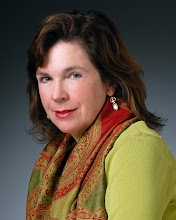At what point does a character become real?
At waltz class last night I was talking to Ed, a fellow dancer and sci-fi/fantasy writer, who was saying what I've heard so many other writers say, i.e., that at some point in the story his characters begin to take on a life of their own. I'm not a writer who tends to have that sort of experience - I always remain conscious that I have created my characters and that to some degree I am moving them around like chess pieces - but there is a funny and quasi-magical moment when other people begin to think of them as real. Like for example I've just finished looking at the proofs for Love in Mid Air. An exciting part of the process. The book was very lightly edited, hardly any changes at all except for things like comma additions. but at one point there was a back and forth exchange in the margin between the editor and copy editor. They write in different color pencils so I could see the dialogue and the comments were about a line in the book, near the end, when Kelly casually mentions that back in high school Elyse was the homecoming queen.
It is a somewhat significant exchange despite the off-the-cuff way in which I've set it up. Throughout the book we see that Elyse thinks Kelly is beautiful and perfect....that she's blind to her faults in that way women often are with their best friends. Since the book is told from Elyse's POV it's easy to assume that yes, Kelly is the princess and Elyse is less-so. This exchange is my hint that Elyse's POV might not be entirely accurate and that, in fact, Kelly sees Elyse as the blessed one, the one who was always confident and beautiful and full of friends, an angle that is explored in the second book, which is told from Kelly's POV.
It's not a major point - just a nod to the fact that women sometimes put their friends on pedestals and yet are blind to their own beauty.
But then there is this dialogue in the margin in which the editor says that it seems more likely Kelly would have been the Homecoming Queen and the copy editor writes back that he can totally see Elyse being the Homecoming Queen and then the editor writes something else back.... The comments required no response from me, but it was a strange moment, a realization that Kelly and Elyse were real enough that these two people would believe they had a past, that they once were in high school, that they would debate (with a high degree of insight) about which of them might have been more popular 30 years ago.
It reminds me of the time this same editor required an additional scene and I was telling this to my agent. A three way conversation followed in which I proposed a scenario and both of them sort of said some version of "No, I don't think Elyse would do that." Which was fine - maybe my original idea wasn't the best and I later came up with something better - but it was another funny moment, having the two of them tell me what Elyse would or would not do. I felt like saying "I'll gladly come up with another idea but - just for the record - Elyse will do anything I make her do. She's not real."
I think in the long run this may be one of the more rewarding aspects of writing a book, having people react like this to your characters. For me their evolution was so incremental that I can't point to a single moment and say "This is where Kelly became real" but it pleases me to see, in hindsight, that at some point, without me fully realizing it, she must have taken on a bit of a life of her own.
Subscribe to:
Post Comments (Atom)

What an interesting post! You're able to make a real distinction between the world of reading and the world of writing. Hard to do, but fascinating when you can really appreciate it!
ReplyDelete